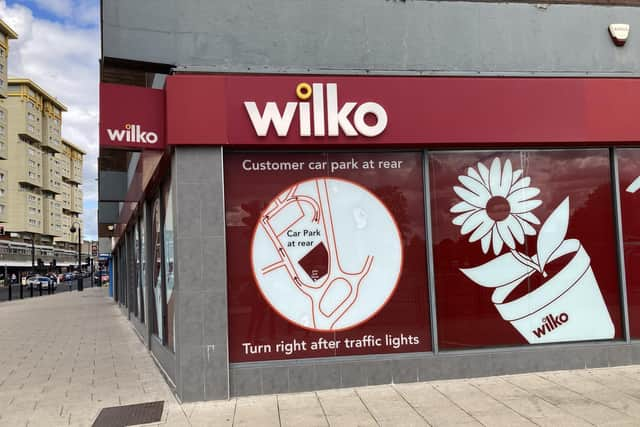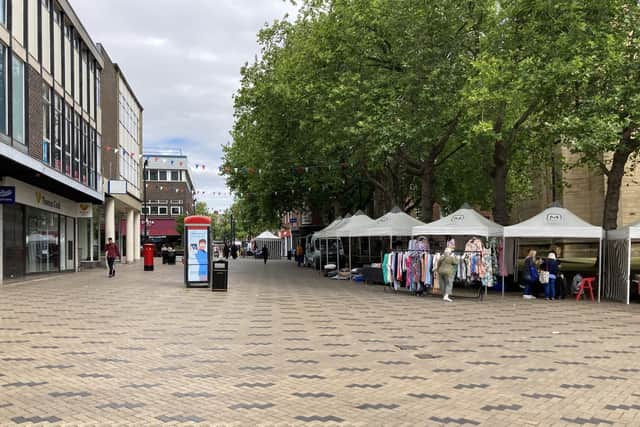Wilko has ‘no plans to leave’ Wakefield as Kirkgate store faces compulsory purchase order in council redevelopment plans
and live on Freeview channel 276
Wakefield Council is to consider making compulsory orders (CPOs) on a number of properties to make way for two ambitious projects designed to transform the city centre.
Senior councillors are being asked to approve the use of CPOs “in principle” to meet the Government’s 2026 deadline for completing the work.
Advertisement
Hide AdAdvertisement
Hide AdThe proposals come after the council won a £48.8m slice of a £3.6bn Government funding pot to bring forward regeneration and investment projects.


The Towns Fund awarded £23.9m to Castleford and £24.9m to Wakefield in 2019 after bids were invited to improve transport, regeneration, digital infrastructure, connectivity, skills and culture.
The Wilko store is one of the properties earmarked to make way for the Kirkgate Neighbourhood Gateway project.
The proposed residential and commercial development site extends from the
Advertisement
Hide AdAdvertisement
Hide Adformer ABC Cinema to Wilko on Kirkgate, to Sun Lane and Marsh Way.


A spokesman for Wilko said: “We have a lease until 2033 in Wakefield and have had some very early discussions with the local authority.
“We’re committed to serving our loyal customers and have no plans to leave.”
In January, Wilko announced the closure of 15 shops across the UK as a cost-cutting measure but said it was committed to Wakefield.The Council is also seeking to “acquire and demolish” properties at the bottom of Bread Street in order to build a new public square.


Advertisement
Hide AdAdvertisement
Hide AdThe new square will provide space for festivals and events, together with providing more Covid-safe open space next to Wakefield Cathedral.
A report to the Cabinet states: “Subsequent demolition will facilitate the delivery of our proposals.
“Currently, some landowners have established a position that would see a sale price substantially in excess of the market value and therefore terms have not been agreed.
“Acquisition of the land identified is critical to project delivery.
Advertisement
Hide AdAdvertisement
Hide Ad“Failure to acquire in a timely manner will result in delays to the project.”
The report, to be considered at a meeting on July 19, states that CPOs would only be used as a “last resort”.
It adds: “The Council’s preference is to acquire by private treaty, following agreement of the value of property and any related reasonable costs.”
Cabinet members are also being urged to approve the use of CPOs so two other projects in Castleford can go ahead.
Advertisement
Hide AdAdvertisement
Hide AdThe report continues: “The Town Deal programme represents significant investment in Wakefield and Castleford, aiming to improve the urban environment for residents, businesses, and visitors, supporting the local cultural and leisure offers while also (particularly in the case of the Castleford programme) improving transport links.”
The two Wakefield projects included in the Town Deal funding are:
1. The Kirkgate Neighbourhood Gateway
Lower Kirkgate is considered at a major city centre gateway and a key route between the city centre and Wakefield’s waterfront.
In its current form, the site is deemed to be a “blight” on the area, including Kirkgate Railway Station.
Advertisement
Hide AdAdvertisement
Hide AdPlans include a residential-led development, plus car parking and commercial properties.
The project will involve the demolition of buildings, leaving only four existing properties and the Harewood Arms pub.
Towns Fund investment will refurbish The Harewood Arms and three of the four other units.
The project aims to encourage “younger professionals” to live in the city.
Advertisement
Hide AdAdvertisement
Hide AdIt also aims to “bring year-round day and evening vibrancy to Wakefield City Centre” and “offer sustainable living in a desirable location.”
2. The Bread St/Cathedral Square project.
The Cathedral Square project was first proposed in the Future High Streets Fund bid in 2020 to regenerate the area.
The bid was unsuccessful but the Council continued to develop the proposal within the Towns Fund bid
The Bread Street project will deliver a new public square through the acquisition and demolition of underused buildings.
Advertisement
Hide AdAdvertisement
Hide AdThe new square will provide more space for festivals and events.
Building façades along Bread Street will be improved to encourage greater footfall and use of the vacant units.
Bread Street was historically home to independent retailers, but has fallen into decline over the years.
The Council report states: “A relatively narrow street, it has only one remaining active frontage and has largely gradually become more of a ‘back alley’ used for servicing businesses along the adjacent Cross Street and Little Westgate.”
Advertisement
Hide AdAdvertisement
Hide Ad“This transition has largely been due to Bread Street being severed at the Cathedral end by 1960’s development on Northgate, namely by two underused retail and office premises.
“These buildings act as a physical barrier to Bread Street, preventing footfall in an already weak city retail market.”
The report adds: “The existing precinct is not fit for purpose to provide an events platform.”
